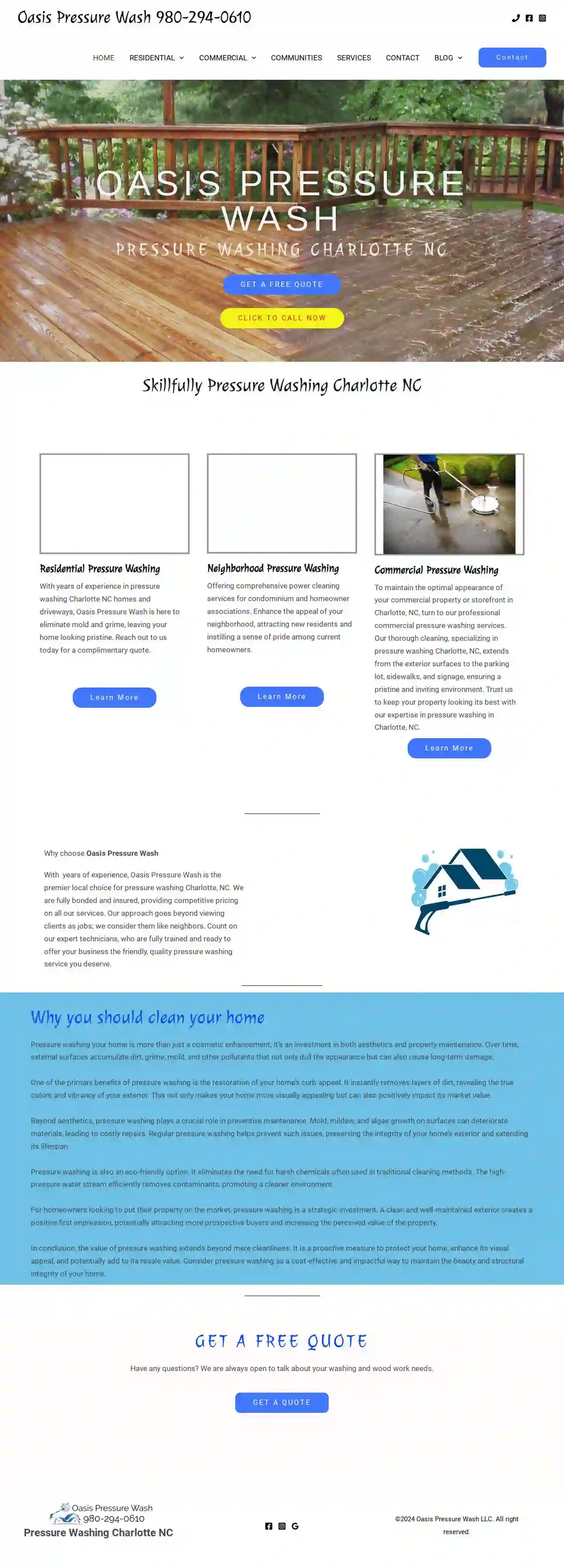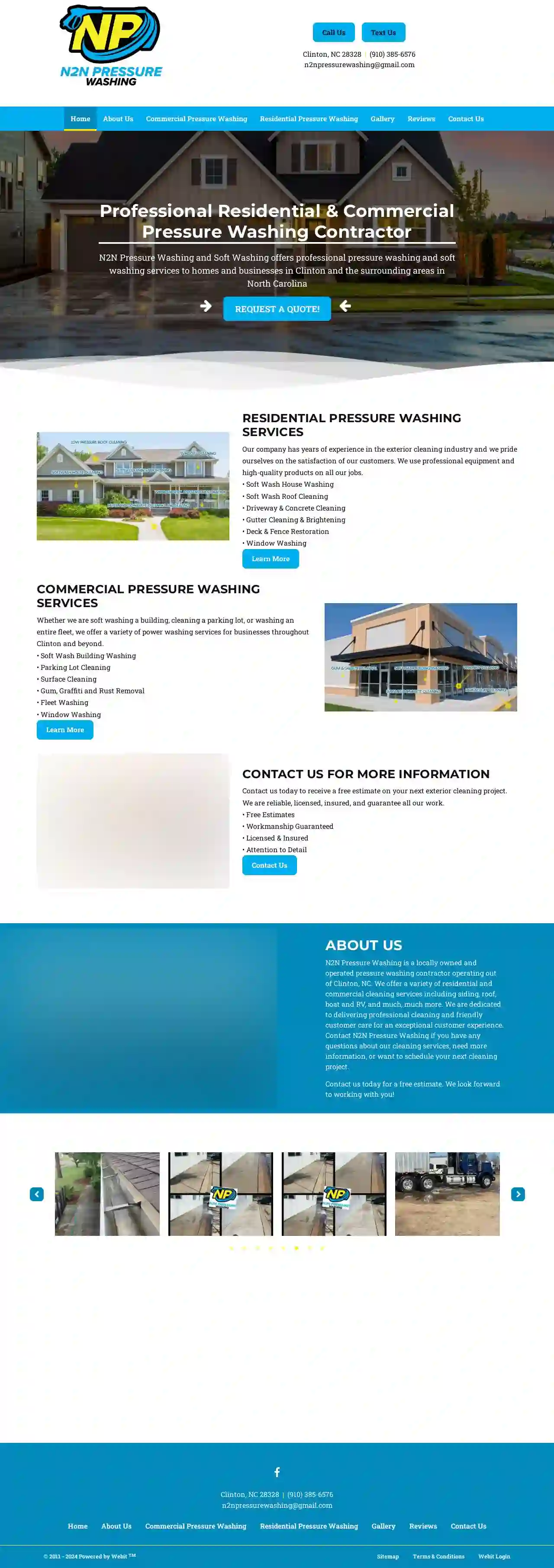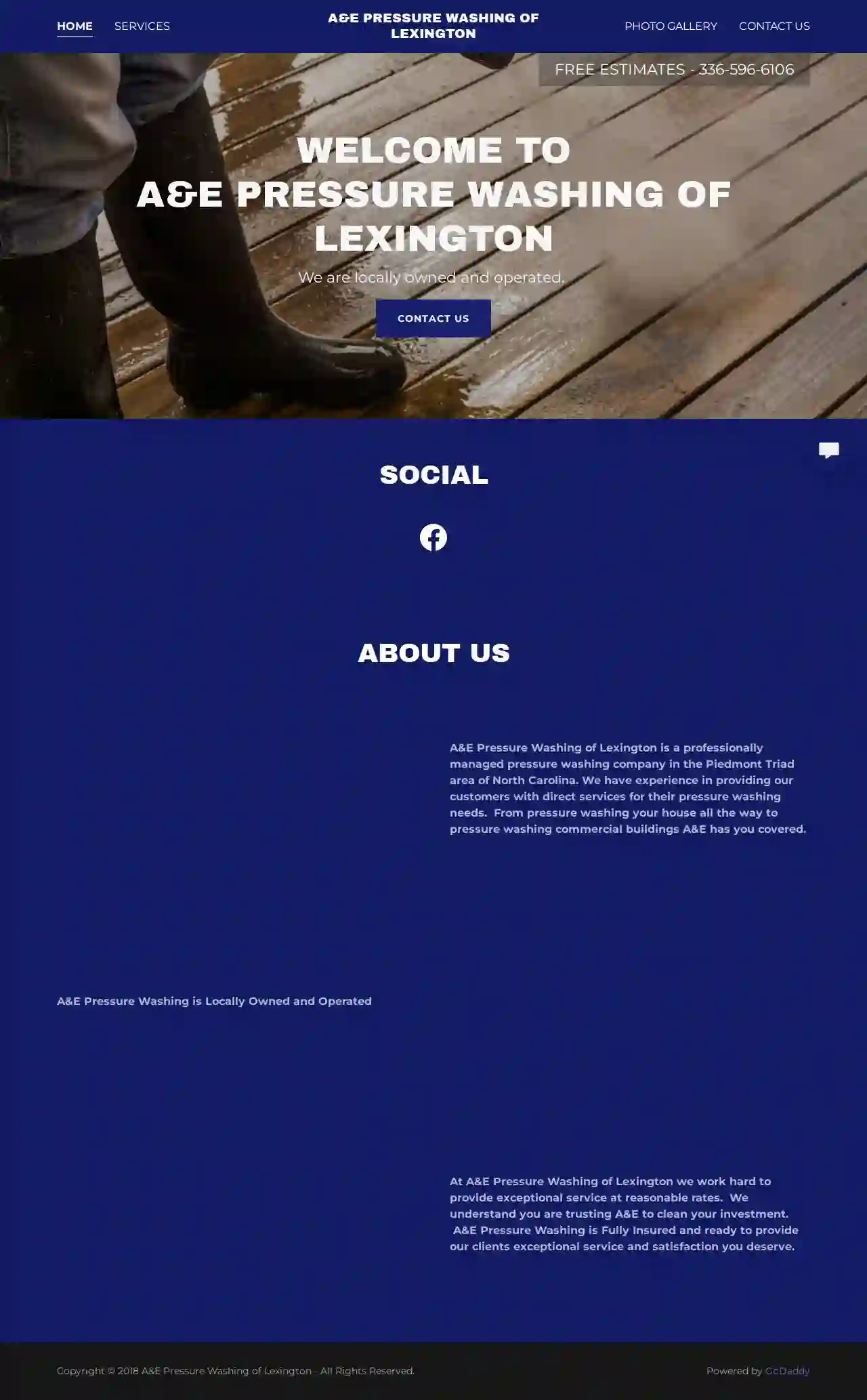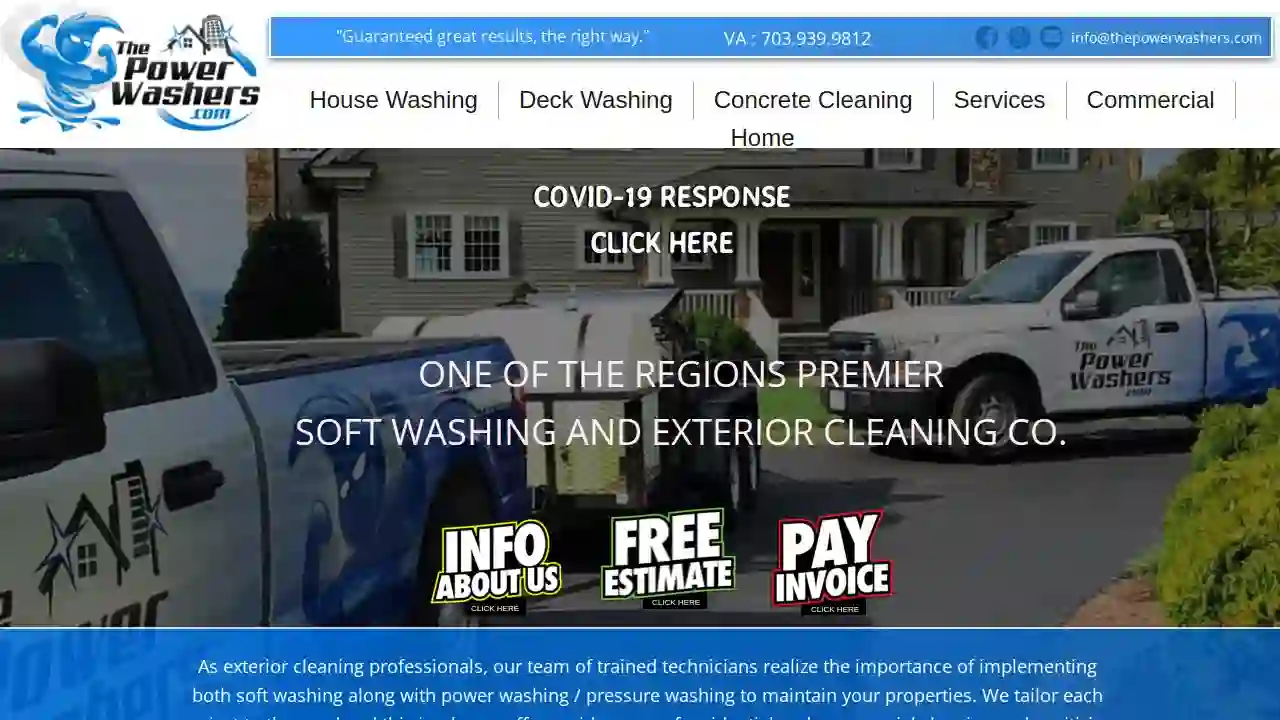Pressure Washing Hillsborough
Top 10 Deck and Fence Cleaning in Hillsborough
Receive multiple Exterior Cleaning quotes for your project today! Compare profiles, reviews, accreditations, portfolio, etc... and choose the best service.

Oasis Pressure Wash
Charlotte, NC, 123 Main St, 980-294-0610, USOasis Pressure Wash is a local business that specializes in pressure washing Charlotte NC homes and driveways. With years of experience, we offer comprehensive power cleaning services for residential, commercial, and condominium properties. Our approach goes beyond viewing clients as jobs; we consider them like neighbors. Count on our expert technicians, who are fully trained and ready to offer your business the friendly, quality pressure washing service you deserve. Pressure washing your home is more than just a cosmetic enhancement; it’s an investment in both aesthetics and property maintenance. Over time, external surfaces accumulate dirt, grime, mold, and other pollutants that not only dull the appearance but can also cause long-term damage. One of the primary benefits of pressure washing is the restoration of your home’s curb appeal. It instantly removes layers of dirt, revealing the true colors and vibrancy of your exterior. This not only makes your home more visually appealing but can also positively impact its market value. Beyond aesthetics, pressure washing plays a crucial role in preventive maintenance. Mold, mildew, and algae growth on surfaces can deteriorate materials, leading to costly repairs. Regular pressure washing helps prevent such issues, preserving the integrity of your home’s exterior and extending its lifespan. Pressure washing is also an eco-friendly option. It eliminates the need for harsh chemicals and reduces the risk of environmental damage.
- Services
- Why Us?
- Gallery
Get Quote
N2N Pressure Washing
563 reviews303 Warsaw Road, Clinton, 28328, USN2N Pressure Washing and Soft Washing is a locally owned and operated pressure washing contractor operating out of Clinton, NC. We offer a variety of residential and commercial cleaning services including siding, roof, boat and RV, and much, much more. We are dedicated to delivering professional cleaning and friendly customer care for an exceptional customer experience. Contact N2N Pressure Washing if you have any questions about our cleaning services, need more information, or want to schedule your next cleaning project.
- Services
- Why Us?
- Testimonials
- Gallery
Get Quote
Charlotte Power Washing
Suite 460, 205 Regency Executive Park Drive, Charlotte, 28217, USCharlotte Power Washing (CPW) is a pressure washing company in Charlotte, NC. We have over 10 years of experience when it comes to delivering professional pressure washing services to residences, commercial properties, and communities. No matter the size or complexity of the task, we provide our clients with unmatched performance and competitive pricing on all our services. We use professional-grade equipment and tried-and-tested techniques. Our team of technicians is also fully-trained to keep your property clean, beautiful, and well-maintained. Nevertheless, CPW is fully bonded and insured so clients won’t have to worry about costs associated with potential issues or damages. At CPW, we think of our clients as neighbors — not jobs — so we will do everything to make sure that you receive the quality service that you deserve. Since cleaning is a regular part of maintenance, we hope to be a part of your lives for many years to come.
- Services
- Why Us?
- Gallery
Get Quote
A&E Pressure Washing of Lexington
58 reviewsLexington, North Carolina, United States, USWelcome to A&E Pressure Washing of Lexington. We are locally owned and operated. A&E Pressure Washing of Lexington is a professionally managed pressure washing company in the Piedmont Triad area of North Carolina. We have experience in providing our customers with direct services for their pressure washing needs. From pressure washing your house all the way to pressure washing commercial buildings A&E has you covered. At A&E Pressure Washing of Lexington we work hard to provide exceptional service at reasonable rates. We understand you are trusting A&E to clean your investment. A&E Pressure Washing is Fully Insured and ready to provide our clients exceptional service and satisfaction you deserve.
- Services
- Why Us?
- Gallery
Get Quote
The Power Washers of Charlotte
54 reviews105 Executive Drive #230, Sterling, 20166, USThe Power Washers is one of the region's premier soft washing and exterior cleaning companies. We offer a wide range of residential and commercial cleaning and sanitizing services that can restore the original look of your property and help you keep it shining for years to come. Our team of trained technicians realizes the importance of implementing both soft washing and power washing/pressure washing to maintain your properties. We tailor each project to the need and offer a free estimate. We serve various areas including Aldie, Alexandria, Annandale, Arlington, Ashburn, Bristow, Brambleton, Bealeton, Braemar, Burke, Centreville, Clifton, Chantilly, Dale City, Dulles, Dumfries, Fairfax, Fairfax Station, Falls Church, Fredericksburg, Gainesville, Great Falls, Haymarket, Herndon, Leesburg, Lansdowne, Lake Ridge, Lorton, Manassas, McLean, Middleburg, Montclair, Nokesville, Oakton, Potomac Falls, Reston, South Riding, Springfield, Stafford, Sterling, Tysons, Vienna, Warrenton, and Woodbridge.
- Services
- Why Us?
- Gallery
Get Quote
Tri Cities Powerwashing LLC
54 reviewsApex, USWelcome to Tri Cities Powerwashing! We specialize in restoring color and vibrance to your home, business, and surroundings. Our team of experienced professionals provides a broad range of pressure washing services, including roof washing, hard scape pressure washing, soft washing, window washing, fence cleaning, oil stain removal, and rust removal. We're dedicated to helping you maintain impeccable properties for your residential or commercial space. At Tri Cities Powerwashing, we understand the importance of a clean and well-maintained exterior. That's why we offer a wide range of pressure washing services to meet your specific needs. Whether you need to refresh your home's curb appeal or prepare your commercial property for a new season, we have the expertise and equipment to get the job done right. Our commitment to quality and customer satisfaction is unwavering. We use only the highest quality products and techniques to ensure that your property looks its best. We're also fully insured and licensed, so you can rest assured that you're in good hands. Contact us today for a free quote and let us help you restore the beauty of your property.
- Services
- Why Us?
- Gallery
Get Quote
Sandhills Soft Wash
518 reviewsSanford, 27330, USSANDHILLS SOFT WASH is dedicated to customer satisfaction through excellent service, training, and professionalism. Sandhills Soft Wash was established in October of 2019, by Chad Ellis (local firefighter). Originally starting as a father and son business known as Ellis Exteriors. The wheels of creating a plan to expand to more areas and larger projects started to come together. Unfortunately, during the summer of 2021, Chad's father unexpectedly passed away, leaving all plans at halt. But after much thought and planning Chad made the decision to continue with the plans and goals, he and his father had started. Keeping in mind the Small Family-Owned business, the decision to change the name to Sandhills Soft Wash came to be in the beginning of 2022. Sandhills Soft Wash is not only owned by a First Responder, but also operated by First Responders. Working in the areas of: Sanford, Cameron, Pinehurst, Apex, Cary, Raleigh, Durham, etc... “Our employees take great pride in all their work to make everything precise and will not leave the property until the customer is 100% satisfied. In all combined, the Fire Fighters that work for Sandhills Soft Washing have more than 40 years of experience in the service industry.” Stated by Chad. From 2019 to 2024, Sandhills Soft Wash growth has exceeded previous plans that were spoken upon in the beginning of Ellis Exteriors (back in 2019). Recurring customers, new customers, servicing different areas, contracting commercial shopping areas, and adding new services. Sandhills Soft Wash goes above and beyond being a Small Family-Owned Business. “Preparing future goals and being able to pass this business down to my son are what I look forward to in years to come.”-Chad. Lastly, Sandhills Soft Wash is always setting goals and doing their best to meet every single one. Keeping up with the last equipment and adding new services to better serve their customers.Be sure to check out Sandhills Soft Wash service options below with full detail. Mission Statement: Dedicated to customer satisfaction through excellent service, training, and professionalism.
- Services
- Why Us?
- Our Team
- Gallery
Get Quote
Knock out pressure washing
4.990 reviewsFayetteville, USAt Knock Out Pressure Washing, we're not just about pressure washing. We offer a comprehensive suite of services, including softwashing, roof cleaning, holiday lighting, and solar panel cleaning. Your property's exterior is in good hands with our diverse range of expert services. We are committed to delivering high-quality work with punctuality and professionalism that is second to none. Our experience in the field guarantees a job well done every time. We want to make sure you feel completely secure when you choose our services. That's why we hold a $2 million insurance policy. With Knock Out Pressure Washing, you can relax knowing that we have all the necessary precautions in place for any situation. We're always learning and adapting, making it a point to stay on top of the latest industry techniques, equipment, and chemical applications. When you choose us, you're choosing a company dedicated to bringing you the best, most efficient service possible.
- Services
- Why Us?
- Testimonials
- Gallery
Get Quote
Pressure Wash Carolina
4.9389 reviews123 Main St, Charlotte, 28205, USPressure Wash Carolina is a veteran husband and wife team that provides professional house washing, soft washing, and other pressure washing services to help your home exterior look brand new. They treat every client like family and offer a 100% satisfaction guarantee. Their services include house washing, fence washing, deck & dock washing, soft washing brick & stone, concrete surface cleaning, roof washing, gutter washout, and porch maintenance. They also provide sanitization services that protect against the COVID virus according to the EPA cleaning standards.
- Services
- Why Us?
- Accreditations
- Our Team
- Testimonials
- Gallery
Get Quote
Streamline Pro-Wash Pressure Washing
5136 reviews12443 Cardinal Point Rd, Charlotte, 28269, USWe Love Making the Exterior Surfaces of Your Home Shine Like New! Our pressure washing experts love to see a home reach its full potential, and we love making your home's exterior surfaces shine like new! So, don't delay, call us today at 980-345-0875! We are veteran owned and operated, that means we strive to give you 100% satisfaction. Choosing us for your home's exterior cleaning needs, such as gutter cleaning, house washing, concrete cleaning, and more, is the best decision you can make for your home. You will never be disappointed with the work done by the talented technicians at Streamline Pro-Wash. We Take the Prize in Safety & Service. Learn More.
- Services
- Why Us?
- Our Team
- Testimonials
- Gallery
Get Quote
Over 60,241+ Janitorial Companies onboarded
Our cleaning contractors operate in Hillsborough & surroundings!
CleaningMatch has curated and vetted the Best Janitorial Companies in and around Hillsborough. Find a trustworthy pro today.
Frequently Asked Questions About Pressure Washing
- Pressure Washing: Suitable for hard surfaces like concrete, brick, stone, and decks that can withstand high pressure. Effective for removing stubborn dirt, grime, and stains.
- Soft Washing: Best for delicate surfaces like roofs, siding, painted surfaces, and wood fences that may be damaged by high pressure. Effective for removing mold, mildew, algae, and other contaminants without causing harm.
- Experience: 'How long have you been in business, and what types of pressure washing projects do you specialize in?'
- Licensing and Insurance: 'Are you licensed, insured, and bonded? Can I see proof of coverage?'
- Equipment and Techniques: 'What type of pressure washer do you use? What cleaning solutions do you use, and are they safe for my surfaces?'
- Safety Precautions: 'What safety precautions do you take during pressure washing?'
- Surface Preparation: 'Will you need to move any furniture or objects before pressure washing?'
- Water Usage: 'Do you use a water reclamation system or other methods to conserve water?'
- Cleanup: 'How do you handle cleanup after pressure washing?'
- Guarantees: 'Do you offer a satisfaction guarantee?'
- References: 'Can you provide references from previous clients?'
- Reputation and Reviews: Check online reviews and ask for referrals to gauge the company's reputation and customer satisfaction.
- Experience and Expertise: Look for a company with a proven track record and experience in pressure washing various surfaces.
- Licensing and Insurance: Ensure the company is licensed and insured to protect you from liability.
- Equipment and Techniques: Inquire about the company's equipment and techniques to ensure they use appropriate pressure levels and cleaning solutions.
- Quotes and Pricing: Obtain detailed quotes that outline all services and costs.
- Professionalism and Communication: Choose a company that is responsive, communicative, and professional.
- Using Excessive Pressure: High-pressure water spray can damage delicate surfaces like wood siding or painted surfaces.
- Using the Wrong Nozzle: Different nozzles produce different spray patterns and pressure levels. Using the wrong nozzle can cause streaks, uneven cleaning, or damage.
- Holding the Nozzle Too Close to the Surface: Holding the nozzle too close can etch or damage the surface. Maintain a safe distance as recommended by the pressure washer manufacturer.
- Skipping Pre-Treatment: For stubborn stains or mold growth, pre-treating the surface with a cleaning solution can enhance cleaning effectiveness.
- Not Protecting Plants and Landscaping: Pressure washing chemicals and debris can harm plants and landscaping. Cover or shield sensitive areas before pressure washing.
How do I know if I need pressure washing or soft washing?
If you're unsure which method is best for your surfaces, consult with a professional pressure washing company. They can assess your needs and recommend the most appropriate cleaning method.
What questions should I ask a pressure washing contractor before hiring them?
By asking these questions, you can gather valuable information and choose a pressure washing contractor that meets your requirements.
What should I look for in a pressure washing company?
A reputable pressure washing company will prioritize safety, use appropriate cleaning methods, and provide excellent customer service.
What are some common pressure washing mistakes to avoid?
If you're unsure about pressure washing techniques or the appropriate pressure levels for your surfaces, consult with a professional pressure washing company.
How do I know if I need pressure washing or soft washing?
- Pressure Washing: Suitable for hard surfaces like concrete, brick, stone, and decks that can withstand high pressure. Effective for removing stubborn dirt, grime, and stains.
- Soft Washing: Best for delicate surfaces like roofs, siding, painted surfaces, and wood fences that may be damaged by high pressure. Effective for removing mold, mildew, algae, and other contaminants without causing harm.
If you're unsure which method is best for your surfaces, consult with a professional pressure washing company. They can assess your needs and recommend the most appropriate cleaning method.
What questions should I ask a pressure washing contractor before hiring them?
- Experience: 'How long have you been in business, and what types of pressure washing projects do you specialize in?'
- Licensing and Insurance: 'Are you licensed, insured, and bonded? Can I see proof of coverage?'
- Equipment and Techniques: 'What type of pressure washer do you use? What cleaning solutions do you use, and are they safe for my surfaces?'
- Safety Precautions: 'What safety precautions do you take during pressure washing?'
- Surface Preparation: 'Will you need to move any furniture or objects before pressure washing?'
- Water Usage: 'Do you use a water reclamation system or other methods to conserve water?'
- Cleanup: 'How do you handle cleanup after pressure washing?'
- Guarantees: 'Do you offer a satisfaction guarantee?'
- References: 'Can you provide references from previous clients?'
By asking these questions, you can gather valuable information and choose a pressure washing contractor that meets your requirements.
What should I look for in a pressure washing company?
- Reputation and Reviews: Check online reviews and ask for referrals to gauge the company's reputation and customer satisfaction.
- Experience and Expertise: Look for a company with a proven track record and experience in pressure washing various surfaces.
- Licensing and Insurance: Ensure the company is licensed and insured to protect you from liability.
- Equipment and Techniques: Inquire about the company's equipment and techniques to ensure they use appropriate pressure levels and cleaning solutions.
- Quotes and Pricing: Obtain detailed quotes that outline all services and costs.
- Professionalism and Communication: Choose a company that is responsive, communicative, and professional.
A reputable pressure washing company will prioritize safety, use appropriate cleaning methods, and provide excellent customer service.
What are some common pressure washing mistakes to avoid?
- Using Excessive Pressure: High-pressure water spray can damage delicate surfaces like wood siding or painted surfaces.
- Using the Wrong Nozzle: Different nozzles produce different spray patterns and pressure levels. Using the wrong nozzle can cause streaks, uneven cleaning, or damage.
- Holding the Nozzle Too Close to the Surface: Holding the nozzle too close can etch or damage the surface. Maintain a safe distance as recommended by the pressure washer manufacturer.
- Skipping Pre-Treatment: For stubborn stains or mold growth, pre-treating the surface with a cleaning solution can enhance cleaning effectiveness.
- Not Protecting Plants and Landscaping: Pressure washing chemicals and debris can harm plants and landscaping. Cover or shield sensitive areas before pressure washing.
If you're unsure about pressure washing techniques or the appropriate pressure levels for your surfaces, consult with a professional pressure washing company.